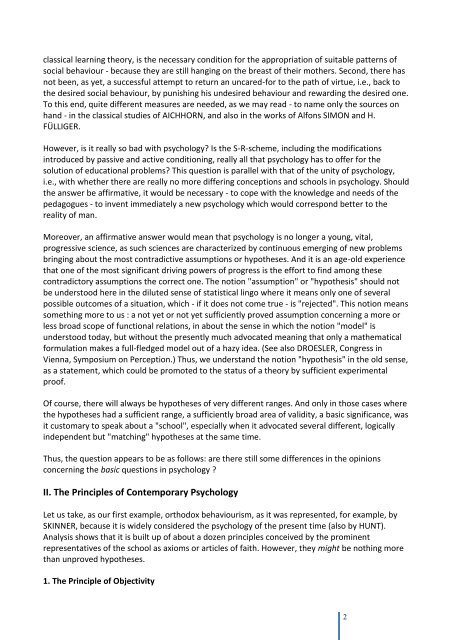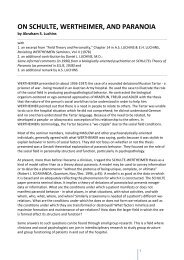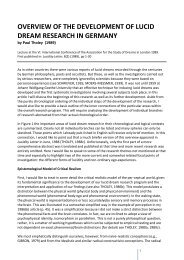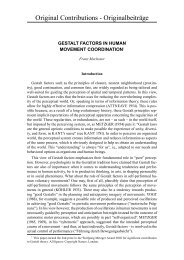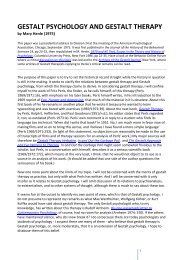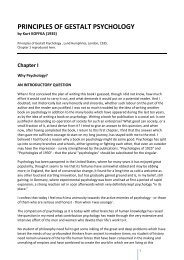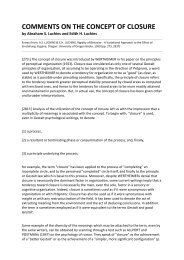pdf-Download - Society for Gestalt Theory and its Applications (GTA)
pdf-Download - Society for Gestalt Theory and its Applications (GTA)
pdf-Download - Society for Gestalt Theory and its Applications (GTA)
You also want an ePaper? Increase the reach of your titles
YUMPU automatically turns print PDFs into web optimized ePapers that Google loves.
classical learning theory, is the necessary condition <strong>for</strong> the appropriation of suitable patterns of<br />
social behaviour - because they are still hanging on the breast of their mothers. Second, there has<br />
not been, as yet, a successful attempt to return an uncared-<strong>for</strong> to the path of virtue, i.e., back to<br />
the desired social behaviour, by punishing his undesired behaviour <strong>and</strong> rewarding the desired one.<br />
To this end, quite different measures are needed, as we may read - to name only the sources on<br />
h<strong>and</strong> - in the classical studies of AICHHORN, <strong>and</strong> also in the works of Alfons SIMON <strong>and</strong> H.<br />
FÜLLIGER.<br />
However, is it really so bad with psychology? Is the S-R-scheme, including the modifications<br />
introduced by passive <strong>and</strong> active conditioning, really all that psychology has to offer <strong>for</strong> the<br />
solution of educational problems? This question is parallel with that of the unity of psychology,<br />
i.e., with whether there are really no more differing conceptions <strong>and</strong> schools in psychology. Should<br />
the answer be affirmative, it would be necessary - to cope with the knowledge <strong>and</strong> needs of the<br />
pedagogues - to invent immediately a new psychology which would correspond better to the<br />
reality of man.<br />
Moreover, an affirmative answer would mean that psychology is no longer a young, vital,<br />
progressive science, as such sciences are characterized by continuous emerging of new problems<br />
bringing about the most contradictive assumptions or hypotheses. And it is an age-old experience<br />
that one of the most significant driving powers of progress is the ef<strong>for</strong>t to find among these<br />
contradictory assumptions the correct one. The notion "assumption" or "hypothesis" should not<br />
be understood here in the diluted sense of statistical lingo where it means only one of several<br />
possible outcomes of a situation, which - if it does not come true - is "rejected". This notion means<br />
something more to us : a not yet or not yet sufficiently proved assumption concerning a more or<br />
less broad scope of functional relations, in about the sense in which the notion "model" is<br />
understood today, but without the presently much advocated meaning that only a mathematical<br />
<strong>for</strong>mulation makes a full-fledged model out of a hazy idea. (See also DROESLER, Congress in<br />
Vienna, Symposium on Perception.) Thus, we underst<strong>and</strong> the notion "hypothesis" in the old sense,<br />
as a statement, which could be promoted to the status of a theory by sufficient experimental<br />
proof.<br />
Of course, there will always be hypotheses of very different ranges. And only in those cases where<br />
the hypotheses had a sufficient range, a sufficiently broad area of validity, a basic significance, was<br />
it customary to speak about a "school", especially when it advocated several different, logically<br />
independent but "matching" hypotheses at the same time.<br />
Thus, the question appears to be as follows: are there still some differences in the opinions<br />
concerning the basic questions in psychology ?<br />
II. The Principles of Contemporary Psychology<br />
Let us take, as our first example, orthodox behaviourism, as it was represented, <strong>for</strong> example, by<br />
SKINNER, because it is widely considered the psychology of the present time (also by HUNT).<br />
Analysis shows that it is built up of about a dozen principles conceived by the prominent<br />
representatives of the school as axioms or articles of faith. However, they might be nothing more<br />
than unproved hypotheses.<br />
1. The Principle of Objectivity<br />
2


